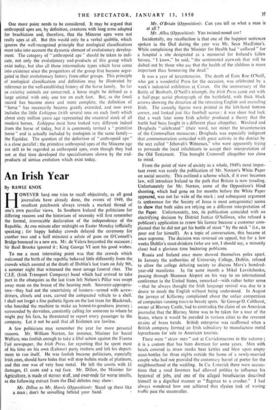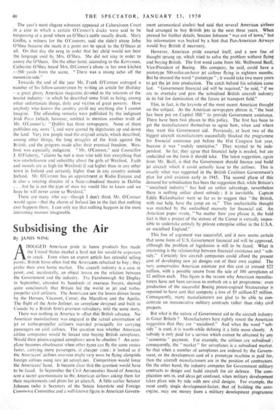An Irish Year
By RAWLE KNOX I OWEVER hard one tries to recall objectively, as all good journalists have already done, the events of 1949, the resultant patchwork always reveals a marked thread of one's own peculiar views. In Southern Ireland the politicians for differing reasons and the historians of necessity will first remember the formal, irrevocable declaration of the independence of the Republic. At one minute after midnight on Easter Monday (officially speaking ; for happy holiday crowds delayed the ceremony for another two and a half minutes) a salute of guns on O'Connell's Bridge bounced in a new era. Mr. de Valera boycotted the occasion ; Sir Basil Brooke ignored it ; King George VI sent his good wishes.
To me a most interesting point was that the crowds which welcomed the birth of the republic behaved little differently from the crowds which assisted at the death of Dublin's last tram on July 9th, a summer night that witnessed the most savage funeral rites. The C.I.E. (Irish Transport Company) band which had arrived to take part in the obsequies as the last tram left Nelson's Pillar was swept away mute on the breast of the heaving mob. Souvenir-appropria- tors—they had not the uncertainty of hunters—armed with screw- drivers, chisels and axes, carved the antiquated vehicle to a shell. I shall not forget a fine pathetic figure on the last tram for Blackrock, who boarded the machine to make an honest-to-goodness journey ; surrounded by dervishes, constantly calling for someone to whom he might pay his fare, he threatened to report every passenger to the company. Let it not be said that all Irishmen are lawless.
A few politicians may remember the year for more personal reasons. Mr. William Norton, for instance, Minister for Social Welfare, was foolish enough to take a libel action against the Fianna Fail newspaper, the Irish Press, for reporting that he spent most of his time on his own (Labour) party matters and left his depart- ment to run itself. He was foolish because politicians, especially Irish ones, should have hides that will stop bullets made of platinum, and this one was of very base metal. He left the courts with Ll damages, £1 costs and a red face. Mr. Dillon, the Minister for Agriculture, is made of sterner stuff, and over-rode far worse insults, as the following extract from the Dail debates may show: Mr. Dillon to Mr. Harris (Opposition): Stand up there like a man ; don't be snivelling behind your hand.' Mr. O'Briain (Opposition): Can you tell us what a man is at all ?
- Mr. Allen (Opposition): You twisted-nosed cur!
Incidentally, my recollection is that one of the happiest sentences spoken in the Dail during the year was Mr. Sean MacEntee's. While complaining that the Minister for Health had " collared " for a hospital a site designated as a memorial for Ireland's fallen heroes, "I know," he said, "the sentimental eyewash that will be dished out by those who say that the health of the children is more important than honouring the dead."
It was a year of tercentenaries. The death of Eoin Roe O'Neill, who got a wonderful Press for the occasion, was celebrated by a week's industrial exhibition at Cavan. On the anniversary of the Battle of Benburb, O'Neill's triumph, the Irish Press came out with a half-page aerial photograph of the battlefield, with thick black arrows showing the direction of the retreating English and encircling Irish. The casualty figures were printed in the left-hand bottom corner, and looked just like football scores ; it was sheer bad luck that a week later some Irish scholar produced a theory that the battle had been fought in a different place altogether. Wexford and Drogheda " celebrated " (their word, not mine) the tercentenaries of the Cromwellian massacres ; Drogheda was especially indignant that commemoration coincided with great activity in the district by the sect called "Jehovah's Witnesses," who were apparently trying to persuade the local inhabitants to accept their interpretation of the Old Testament. This brought Cromwell altogether too close to mind.
From the point of view of society as a whole, 1949's most impor- tant event was surely the publication of Mr. Norton's White Paper on social security. This outlined a scheme which, if it ever becomes law, will introduce Ireland to the path that Britain is now treading. Unfortunately for Mr. Norton, some of the Opposition's blind shooting, which had gone on for months before the White Paper appeared, was not far wide of the mark ; and subsequent argument (a spokesman for the Society of Jesus is most antagonistic) seems to show that both sides are relying on a different interpretation of the Paper. Unfortunately, too, its publication coincided with an electrifying decision by District Justice O'Sullivan, who refused a publican's application to renew his licence because a customer com- plained that he did not get his bottle of stout "by the neck" (i.e., to pour out for himself). As a topic of conversation, this became at once supreme. The decision was reversed on appeal, but for a few weeks Dublin's stout-drinkers (who are not, I should say, a minority class) had a glorious time hectoring publicans.
Russia and Ireland once more showed themselves poles apart. In January the authorities of University College, Dublin, refused to allow the college debating society to discuss Marx's hundred- year-old manifesto. In the same month a Mike! Lavritchenko, passing through Shannon Airport on his way to an international conference in the United States, remarked—with rather better sense —that he always thought the Irish language revival was due to a desire to insult the English without being understood. In August the jarveys of Killarney complained about the unfair competition of companies running tours to beauty spots. Sir George 0. Colthurst, owner of Blarney Castle, had to contradict the claim of an American journalist that the Blarney Stone was to be taken for a tour of the States, where it would be paraded in various cities to the reverent strains of brass bands. British enterprise was reaffirmed when a British company formed an Irish subsidiary to manufacture metal leprechauns for sale to American tourists.
There were "straw men" out at Carrickmacross in the autumn ; it is a custom that has been dormant for some years. Men with heads covered in straw masks beat kettles and blew upon empty stout-bottles for three nights outside the home of a newly-married couple who had not provided the customary barrel of porter for the neighbourhood at the wedding. In Co. Limerick there were accusa- tions that a road foreman had allowed politics to influence his bestowal of jobs, and one of the alleged beneficiaries described himself in a dignified manner as "flagman to a crusher." I had always wondered how one achieved that elysian task of waving traffic past the steamroller. The year's most elegant witnesses appeared at Caherciveen Court in a case in which a certain O'Connor's ducks were said to be trespassing at a pond where an O'Shea's cattle usually drank. Mary Griffin, a witness for the O'Connors, said she didn't abuse John O'Shea because she made it a point not to speak to the O'Sheas at all. On that day she sang in order that her child would not hear the language used by Mrs. O'Shea. She did not sing in order to annoy the O'Sheas. On the other hand, according to the Kerryman, Catherine O'Shea heard Mrs. O'Connor's abuse in her own kitchen —500 yards from the scene. "There was a strong echo off the mountain-side."
Towards the end of the year Mr. Frank O'Connor outraged a number of his fellow-countrymen by writing an article for Holiday —a great glossy American magazine devoted to the interests of the tourist industry—in which he described some Irish as being, among other unfortunate things, dirty and victims of great poverty. How anybody who knows the country could say anything else I cannot imagine. The offending remarks were published by the indignant Irish Press (which, however, omitted to mention another truth of Mr. O'Connor's: "Dublin has three newspapers. None of them publishes any news "), and were quoted by dignitaries up and down the land. Very few people read the original article, which described, among other things, the long struggles of the Irish against the British, and the progress made after their eventual freedom. Wex- ford was especially indignant. "Mr. O'Connor," said Councillor J. O'Flaherty, "claims he met a man who told him everything that was unwholesome and unhealthy about the girls of Wexford. Faith and morals are as high (in Wexford) if not higher than in any other town in Ireland and certainly higher than in any country outside Ireland. Mr. O'Connor has an appointment in Radio Eireann and is also a rotating director of a State-subsidised theatre in Dublin . but he is not the type of man we would like to know and we hope he will never come to Wexford."
There are many who say—though I don't think Mr. O'Connor would agree—that the charm of Ireland lies in the fact that nothing ever happens there. I can only say that nothing happens in the most interesting manner imaginable.































 Previous page
Previous page